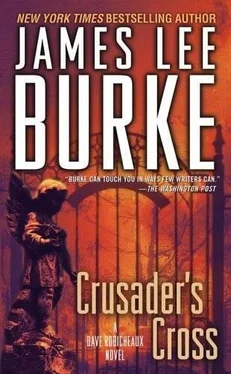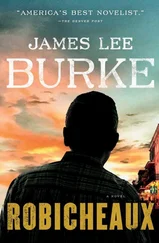
James Lee Burke
Crusader's Cross
Book 14 in the Robicheaux series
For Linda and Roger Grainger
I would like to thank George Schiro and the other staff members at the Acadiana Crime Lab in New Iberia, Louisiana, and also Jim Hutchison, Judi Hoffman, Annalivia Harris, Bahne Klietz, Maureen Kocisko, and Debbie Lewis at the Montana State Crime Lab in Missoula for their patience and kind assistance over the years.
Thanks also to David Rosenthal, Michael Korda, and Chuck Adams for their support and editorial help.
My thanks again to Patricia Mulcahy and my agent Philip G. Spitzer and his assistant Lukas Ortiz for their loyalty and friendship and goodwill.
Lastly, I wish to acknowledge those who have been with me for the long haul – my wife, Pearl, and our children, James L. Burke, Jr., Andree Walsh, Pamela McDavid, and Alafair Burke.
God bless all creatures and things, large and small.
It was the end of an era, one that I suspect historians may look upon as the last decade of American innocence. It was a time we remember in terms of images and sounds rather than historical events – pink Cadillacs, drive-in movies, stylized street hoods, rock 'n' roll, Hank and Lefty on the jukebox, the dirty bop, daylight baseball, chopped-down '32 Fords with Merc engines drag-racing in a roar of thunder past drive-in restaurants, all of it backdropped by palm trees, a curling surf, and a purple sky that had obviously been created as a cinematic tribute to our youth.
The season seemed eternal, not subject to the laws of mutability. At best, it was improbable that the spring of our graduation year would ever be stained by the tannic smell of winter. If we experienced visions of mortality, we needed only to look into one another's faces to reassure ourselves that none of us would ever die, that rumors of distant wars had nothing to do with our own lives.
My half brother was Jimmie Robicheaux. He was a hothead, an idealist, and a ferocious fistfighter in a beer-glass brawl, but often vulnerable and badly used by those who knew how to take advantage of his basic goodness. In 1958, he and I worked ten days on and five days off for what was called a doodlebug outfit, or seismograph crew, laying out rubber cable and seismic jugs in bays and swamps all along the Louisiana-Texas coastline. During the off-hitch, when we were back on land, we hung out at Galveston Island, fishing at night on the jetties, swimming in the morning, eating fried shrimp in a café on the amusement pier where the seagulls fluttered and squeaked just outside the open windows.
The Fourth of July that year was a peculiar day. The barometer dropped and the sky turned a chemical green, and the breakers were full of sand and dead baitfish when they smacked on the beach. The swells were smooth-surfaced and rain-dented between the waves, but down below, the undertow was terrific, almost like steel cable around the thighs, the sand rushing out from under our feet as the waves sucked back upon themselves.
Most swimmers got out of the water.
Perhaps because of our youth or the fact Jimmie and I had drunk too much beer, we swam far out from the beach, to the third sandbar, the last one that provided a barrier between the island itself and the precipitous descent off the edge of the continental shelf. But the sandbar was hard-packed, the crest only two feet below the surface, which allowed the swimmer to sit safely above the tidal current and enjoy a panoramic view of both the southern horizon and the lights that were going on all over the island.
The sun broke through the thunderheads in the west, just above the earth's rim, like liquid fire pooled up inside the clouds. For the first time that day we could see our shadows on the water's surface. Then we realized we were not alone.
Thirty yards out a shark fin, steel-gray, triangular in shape, cut across the swell, then disappeared under a wave. Jimmie and I stood up on the sandbar, our hearts beating, and waited for the fin to resurface. Behind us we could hear the crackle of lightning in the clouds.
"It's probably a sand shark," Jimmie said.
But we both knew that most sand sharks were small, yellowish in hue, and didn't cruise at sunset on the outer shelf. We stared at the water for a long time, then saw a school of baitfish scatter in panic across the surface. The baitfish seemed to sink like silver coins into the depths, then the swell became smooth-surfaced and dark green again, wrinkling slightly when the wind gusted. I could hear Jimmie breathing as though he had labored up a hill.
"You want to swim for it?" I asked.
"They think people are sea turtles. They look up and see a silhouette and see our arms and legs splashing around and think we're turtles," he said.
It wasn't cold, but his skin looked hard and prickled in the wind.
"Let's wait him out," I said.
I saw Jimmie take a deep breath and his mouth form a cone, as though a sliver of dry ice were evaporating on his tongue. Then his face turned gray and his eyes looked into mine.
"What?" I said.
Jimmie pointed southward, at two o'clock from where we stood. A fin, larger than the first one, sliced diagonally across a swell and cut through a cresting wave. Then we saw the shark's back break the surface, a skein of water sliding off skin that was the color of scorched pewter.
There was nothing for it. The sun was setting, like a molten planet descending into its own smoke. In a half hour the tide would be coming in, lifting us off the sandbar, giving us no option except to swim for the beach, our bodies in stark silhouette against the evening sky.
We could hear music and the popping of fireworks on the amusement pier and see rockets and star shells exploding above the line of old U.S. Army officers' quarters along the beachfront. A wave slid across my chest, and inside it I saw the pinkish blue air sac and long tendril-like stingers of a Portuguese man-of-war. It drifted away, then another one, and another fell out of a wave and twisted in an eddy like half-inflated balloons.
It was going to be a long haul to the beach.
"There's sharks in the water! Didn't you fellers see the lifeguard's flag?" a voice called.
I didn't know where the girl had come from. She sat astride an inner tube that was roped to two others, a short wood paddle in her hands. She wore a one-piece black swimsuit and had sandy reddish hair, and her shoulders glowed with sunburn. Behind her, in the distance, I could see the tip of a rock jetty that jutted far out into the breakers.
She paddled her makeshift raft until it had floated directly above the sandbar and we could wade to it.
"Where did you come from?" Jimmie said.
"Who cares? Better jump on. Those jellyfish can sting the daylights out of you" she said.
She was tall and slight of build and not much older than we were, her accent hardcore East Texas. A wave broke against my back, pushing me off balance. "Are you fellers deaf? Y'all sure don't act like you care somebody is trying to hep you out of the big mess you got yourself into," she said.
"We're coming!" Jimmie said, and climbed onto one of the inner tubes.
Waves knocked us over twice and it took us almost a half hour to cross the trough between the third and second sandbars. I thought I saw a fin break the surface and slide across the sun's afterglow, and, once, a hard-bodied object bumped against my leg, like a dull-witted bully pushing past you on a crowded bus. But after we floated past the second sandbar, we entered another environment, one connected to predictability where we could touch bottom with the ends of our toes and smell smoke from meat fires and hear children playing tag in the darkness.
Читать дальше













